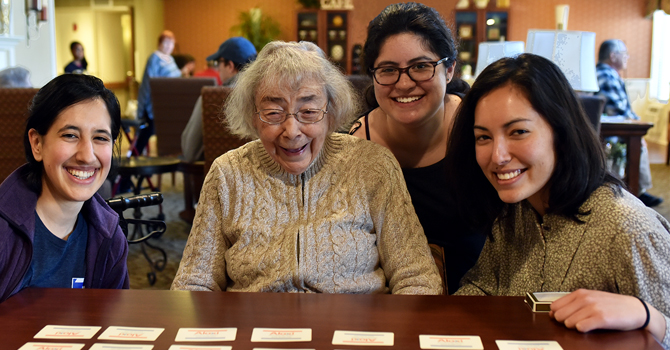Diversity of Social Relationships Is Just as Important as Quantity in Staying Healthy as We Age

Talha Ali
PhD Student in Epidemiology
Each of us is surrounded by a web of relationships that forms our social network. These relationships provide opportunities for social participation and prevent isolation.
Research has confirmed the health benefits of having a large number of social relationships, especially in old age. But does it matter who we're connecting with—family, friends, neighbors? To satisfy their various social, emotional, and health needs, adults turn to different types of social relationships. For instance, we usually depend on friends for participation in social activities but rely on close relatives for support during illness.
Living in isolation can be dangerous for individual health.
In a recent study,1 we established that maintaining diverse relationships is just as important, if not more, than having a large number of relationships. Specifically, we found that individuals with more diverse relationships had a lower risk of mortality and experienced less cognitive and physical decline.1 These associations remained even after we controlled for a number of variables. Our findings suggest that diversity in relationships allows older adults to draw from different resources in response to specific social and health needs.
Currently, about 17 percent of older Americans are socially isolated.2 The proportion of older adults living alone has increased over time as family networks become smaller and more geographically scattered. Living in isolation can be dangerous for individual health. Socially isolated adults have a 29 percent higher risk of death compared to those not living alone.3
By fostering only a few connections across different relationship types, we can gain the support needed to lead a healthy life in old age.
Our findings demonstrate a way to overcome the challenges presented by significant social shifts. While modern family structures often make it difficult to maintain a large number of relationships, by fostering only a few connections across different relationship types, we can gain the support needed to lead a healthy life in old age.
For our study, we defined network diversity as the variety of different types of relationships people maintain in their network—children, friends, relatives, and neighbors. We followed 7,000 older adults over a period of at least 10 years. Participants reported on the total number of individuals in their network (network size) and the different types of relationships in that network (network diversity).
Engaging in social activities acts as a cognitive stimulus that keeps us mentally sharp.
Previous research demonstrated that individuals with many social relationships are less likely to die early than those with fewer relationships.4 Other health benefits of supportive social ties include lower risk of high blood pressure, diabetes, stroke, and depression.5-8 Among older adults, being socially engaged is shown to reduce the risk of heart disease, disability, and dementia.9-11 Individuals who live alone, meanwhile, are twice as likely to develop Alzheimer's disease and experience more rapid cognitive decline.11
In old age, engaging in social activities acts as a cognitive stimulus that keeps us mentally sharp. It is especially important in late life to preserve social relationships because our social networks tend to shrink over time. Retirement, divorce, illness, and death of close friends and relatives lead to losses in social ties that can be hard to replace.
Social ties provide a platform for the exchange of emotional, psychological, and material support. Social support offers a sense of belonging that allows us to cope well with stressful situations. Close social relationships, especially if they are diverse, can also promote positive health behaviors such as exercise and a healthy diet.
References
- Ali, T., Nilsson, C. J., Weuve, J., Rajan, K. B., and de Leon, C. F. M. (2018). Effects of social network diversity on mortality, cognition and physical function in the elderly: a longitudinal analysis of the Chicago Health and Aging Project (CHAP). J Epidemiol Community Health, 72(11), 990-996.
- American Association of Retired Professionals. Framework for Isolation in Adults Over 50.
- Holt-Lunstad, J., Smith, T. B., Baker, M., Harris, T., and Stephenson, D. (2015). Loneliness and social isolation as risk factors for mortality: a meta-analytic review. Perspectives on Psychological Science, 10/2, 227-237.
- Berkman LF, Syme SL. Social networks, host resistance, and mortality: a nine-year follow-up study of Alameda county residents. Am J Epidemiol 1979;109:186–204.
- Redondo-Sendino, Á., Guallar-Castillón, P., Banegas, J. R. and Rodríguez-Artalejo, F. Relationship Between Social Network and Hypertension in Older People in Spain. Rev. Esp. Cardiol. Engl. Ed. 58, 1294–1301 (2005).
- Gallo, L. C. et al. Associations of structural and functional social support with diabetes prevalence in U.S. Hispanics/Latinos: Results from the HCHS/SOL Sociocultural Ancillary Study. J. Behav. Med. 38, 160–170 (2015).
- Nagayoshi, M. et al. Social Network, Social Support, and Risk of Incident Stroke. Stroke 45, 2868–2873 (2014).
- Chi, I. and Chou, K.-L. Social Support and Depression among Elderly Chinese People in Hong Kong. Int. J. Aging Hum. Dev. 52, 231–252 (2001).
- Barefoot, J. C., Grønbæk, M., Jensen, G., Schnohr, P. and Prescott, E. Social Network Diversity and Risks of Ischemic Heart Disease and Total Mortality: Findings from the Copenhagen City Heart Study. Am. J. Epidemiol. 161, 960–967 (2005).
- Avlund, K., Lund, R., Holstein, B. E. and Due, P. Social relations as determinant of onset of disability in aging. Arch. Gerontol. Geriatr. 38, 85–99 (2004).
- Fratiglioni, L., Hui-Xin, W., Ericsson, K., Maytan, M. and Winblad, B. Influence of social network on occurrence of dementia: A community-based longitudinal study. Lancet Lond. 355, 1315–9 (2000).
About the Author
 Talha Ali's research focuses on social relationships and the health of older adults.
Currently, she is developing a typology of social networks of older adults that takes
into account multiple aspects of social networks including structure, function, and
quality of relationships to examine how social network types influence cognitive and
physical health. Ali aims to facilitate deeper understandings of social network patterns
among older adults to inform the development of effective strategies to promote "successful
aging." She holds an MS in Chronic Disease Epidemiology and a BS in Psychology, both from Yale University.
Talha Ali's research focuses on social relationships and the health of older adults.
Currently, she is developing a typology of social networks of older adults that takes
into account multiple aspects of social networks including structure, function, and
quality of relationships to examine how social network types influence cognitive and
physical health. Ali aims to facilitate deeper understandings of social network patterns
among older adults to inform the development of effective strategies to promote "successful
aging." She holds an MS in Chronic Disease Epidemiology and a BS in Psychology, both from Yale University.
